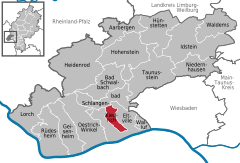Kiedrich
| Kiedrich | ||
|---|---|---|
 |
||
|
||
| Coordinates: 50°2′27″N 8°5′5″E / 50.04083°N 8.08472°ECoordinates: 50°2′27″N 8°5′5″E / 50.04083°N 8.08472°E | ||
| Country | Germany | |
| State | Hesse | |
| Admin. region | Darmstadt | |
| District | Rheingau-Taunus-Kreis | |
| Government | ||
| • Mayor | Winfried Steinmacher (SPD) | |
| Area | ||
| • Total | 12.35 km2 (4.77 sq mi) | |
| Elevation | 150 m (490 ft) | |
| Population (2015-12-31) | ||
| • Total | 4,106 | |
| • Density | 330/km2 (860/sq mi) | |
| Time zone | CET/CEST (UTC+1/+2) | |
| Postal codes | 65399 | |
| Dialling codes | 06123 | |
| Vehicle registration | RÜD | |
Kiedrich is a community in the Rheingau-Taunus-Kreis in the Regierungsbezirk of Darmstadt in Hesse, Germany.
Kiedrich lies in the Rheingau on the south slope of the Taunus, approximately 2 km north from the town of Eltville am Rhein and 3 km from the banks of the Rhine. Kiedrich borders on the community of Schlangenbad in the north, and on the town of Eltville in the east, south, and west.
Kiedrich is first mentioned in a document of the Archbishopric of Mainz. Although the document is not dated, it is known to have originated during the time of Archbishop Frederick (937-954). About 1160 building work began on Scharfenstein Castle. Winegrowing in Kiedrich was first mentioned as early as 1131.
Kiedrich belonged to Electoral Mainz (the Archbishopric), and passed, in 1806, to the Duchy of Nassau. In 1866 it was absorbed by Prussia. The community avoided amalgamation with other municipalities during Hesse’s municipal restructuring.
Through political activities in the three Kiedrich active parties (SPD, CDU, FDP), Kiedrichers have been involved with the framework of the local Agenda 21.
The office of mayor in Kiedrich is currently held by Winfried Steinmacher (SPD), who was directly elected through the first vote system in November 2005, with 77.7% of the vote.
Results of the municipal election held on 26 March 2006:
The organ in the parish church, with approximately 950 pipes, dates from the Late Gothic period, and is one of Germany’s oldest playable organs. The choir of boys and men (lately including girls), the Kiedricher Chorbuben, has, according to documents, been practicing a special Mainz choral dialect of liturgical Latin plainsong at services since 1333 dialect – the dialect is only preserved here. The choir performs a Latin mass most Sundays except during school vacations. Countertenor Andreas Scholl was a member of the choir, his sister Elisabeth Scholl was the first girl to be accepted.
...
Wikipedia




